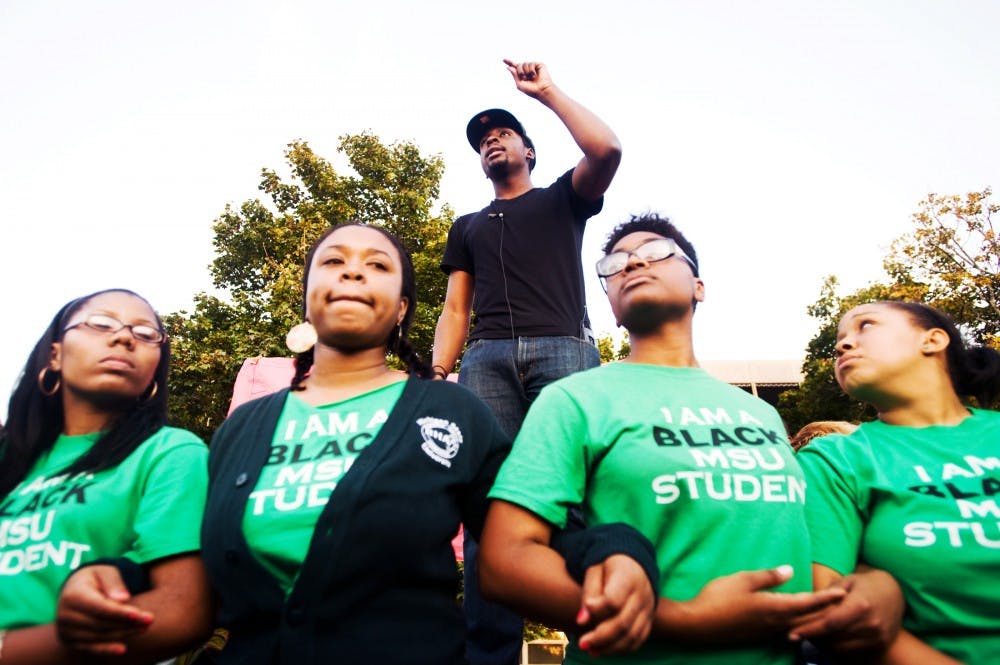At the beginning of January, MSU’s Office for Inclusion and Intercultural Initiatives launched Project 60/50, a program aimed at highlighting academic programs and hosting workshops and events to promote multiculturalism across campus.
The program, which encourages students to feel comfortable coming forward to talk about multicultural issues, is a step in the right direction because it encourages students to talk about the issues we face on campus.
When we met with Black Student Alliance leaders Monday evening, they said Project 60/50 and campaigns where students can pledge support for challenging inequities, such as the Live It program, are beneficial because they promote cultural sensitivity and encourage students not to penalize one another for diversity on campus.
Although Project 60/50 encourages respect for all groups across campus, regardless of their sexual orientation, gender, sex or ethnicity, MSU still is far from where the alliance wants it to be.
In fall of 2011, students marched and rallied after the N-word was found on a student’s door in West Akers Hall and a black doll was found hanging by its neck in the Biomedical and Physical Sciences Building.
Following the march, the Black Student Alliance submitted a list of 22 demands to administration on behalf of MSU’s Council of Racial and Ethnic students and Council of Progressive students. Administration responded by agreeing to quarterly meetings with the student groups to discuss their concerns and progress in improving cultural acceptance on campus, program leaders said during the meeting Monday.
But three years later, students still face racism. We just don’t always hear about it. And to a majority of students, the events go unnoticed and are not reported to the university. An offensive word on a white board might be erased before anyone can take a photo as evidence of the incident. A student said they were questioned in the library and told they don’t belong, solely because of their race and the stereotypes people might have about them.
Alliance members said they hear about these incidents weekly when students approach them and their intercultural aides, and it motivates them to keep pushing for acceptance and awareness.
The organization has several ideas to help improve racial tolerance on campus, including creating cultural sensitivity workshops for incoming students and putting more of an emphasis on multiculturalism and acceptance in MSU’s curriculum.
Their hope is that even if students arrive on campus with preconceived notions about groups based on their race, sexual orientation or religious beliefs, the workshop could serve as a screen to help encourage sensitivity and prevent these incidents from occurring.
The Black Student Alliance has a history of being at the forefront of the movement toward acceptance and equality on our campus. Since the Multicultural Center opened in 1999, the alliance wanted it to have a free-standing location. Fast forward to 2014, and the group still hasn’t seen MSU meet its request.
Although MSU’s renovations to the Union moved the Multicultural Center up to the second floor and expanded it, the group feels it still deserves a space where all minority groups — not just black students — can come together to voice their concerns and host events. They also want it to be a place where classes about other cultures are taught, creating an open space where students can celebrate groups from around the world.
The request for a free-standing Multicultural Center was mentioned in a list of demands submitted to MSU’s administration in 2011. The alliance pointed out the list of 22 demands is meant to benefit all minority students, and isn’t specifically targeted at just helping black students, alliance leadership said Monday.
Their progress has slowed recently. The last meeting with administration was in spring of 2013. Since then, the alliance’s leadership has tried to schedule a meeting with administrators but has been unsuccessful.
Black Student Alliance Residence Hall Association Representative Rashad Timmons said that it is disappointing, but they don’t believe the administration is intentionally avoiding the meeting. Timmons hopes another meeting is scheduled soon because it helps them feel like administrators care about the experiences of the students they represent.
He added he felt very moved when he attended past meetings with other student groups on campus and administrators.
“We’ve been actively pursuing these meetings,” Timmons said, adding as of now, the group plans to keep requesting to meet with administration.
When asked if they felt their voices have been heard by administration, alliance members said yes and no.
“You can never feel like they all the way understand because it’s a living experience,” Black Student Alliance Vice President Kenya Abbott Jr. said. “I don’t believe they don’t 100 percent care, but I’ll say being a student, I care more.”
Support student media!
Please consider donating to The State News and help fund the future of journalism.
Discussion
Share and discuss “Racial intolerance must be addressed” on social media.





